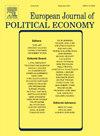Fiscal policy preferences: Evidence from conjoint experiments in Poland
IF 2.4
3区 经济学
Q2 ECONOMICS
引用次数: 0
Abstract
The paper examines public preferences for fiscal policy in Poland using two complementary Adaptive Choice-Based Conjoint (ACBC) experiments on a representative sample of Polish adults. The first experiment – the expenditure conjoint – tests whether and how much respondents are willing to pay in higher taxes to secure additional public services in several crucial domains. The second experiment – the tax conjoint – follows up on these findings by asking how citizens would prefer to pay, testing support for alternative tax solutions. Each proposed tax package is budget neutral, but varies in how burdens are distributed, allowing for an assessment of progressive versus regressive preferences. The study finds support for increased government spending in key policy areas (defense, health, education, and pensions), accompanied by a willingness to finance these expansions through higher taxes. Despite the conventional view of Poland as tax-averse, many respondents appear willing to accept higher taxes if they perceive tangible returns. The results show also a clear preference for tax solutions that shift the burden toward better-off individuals and enhance tax progression. Overall, these findings suggest that, even in tax-skeptical contexts, public preferences can align in favor of higher taxes when benefits are clearly communicated and fairness concerns are addressed.
财政政策偏好:来自波兰联合实验的证据
本文采用两个互补的基于适应性选择的联合(ACBC)实验,对波兰成年人的代表性样本进行了财政政策的公众偏好检验。第一个实验——联合支出——测试被调查者是否以及在多大程度上愿意支付更高的税收,以确保在几个关键领域获得额外的公共服务。第二个实验——税收联合——在这些发现的基础上,通过询问公民更愿意如何支付,测试对替代税收解决方案的支持。每个提议的税收方案都是预算中性的,但在负担如何分配方面有所不同,允许对累进偏好和递减偏好进行评估。该研究发现,人们支持在关键政策领域(国防、卫生、教育和养老金)增加政府支出,同时愿意通过提高税收为这些扩张提供资金。尽管传统观点认为波兰厌恶税收,但许多受访者似乎愿意接受更高的税收,如果他们看到切实的回报。研究结果还表明,人们明显倾向于将负担转移给富裕个人并提高税收累进率的税收解决方案。总的来说,这些发现表明,即使在对税收持怀疑态度的情况下,如果福利得到明确传达,公平问题得到解决,公众的偏好也会倾向于提高税收。
本文章由计算机程序翻译,如有差异,请以英文原文为准。
求助全文
约1分钟内获得全文
求助全文
来源期刊

European Journal of Political Economy
Multiple-
CiteScore
3.40
自引率
10.00%
发文量
106
期刊介绍:
The aim of the European Journal of Political Economy is to disseminate original theoretical and empirical research on economic phenomena within a scope that encompasses collective decision making, political behavior, and the role of institutions. Contributions are invited from the international community of researchers. Manuscripts must be published in English. Starting 2008, the European Journal of Political Economy is indexed in the Social Sciences Citation Index published by Thomson Scientific (formerly ISI).
 求助内容:
求助内容: 应助结果提醒方式:
应助结果提醒方式:


